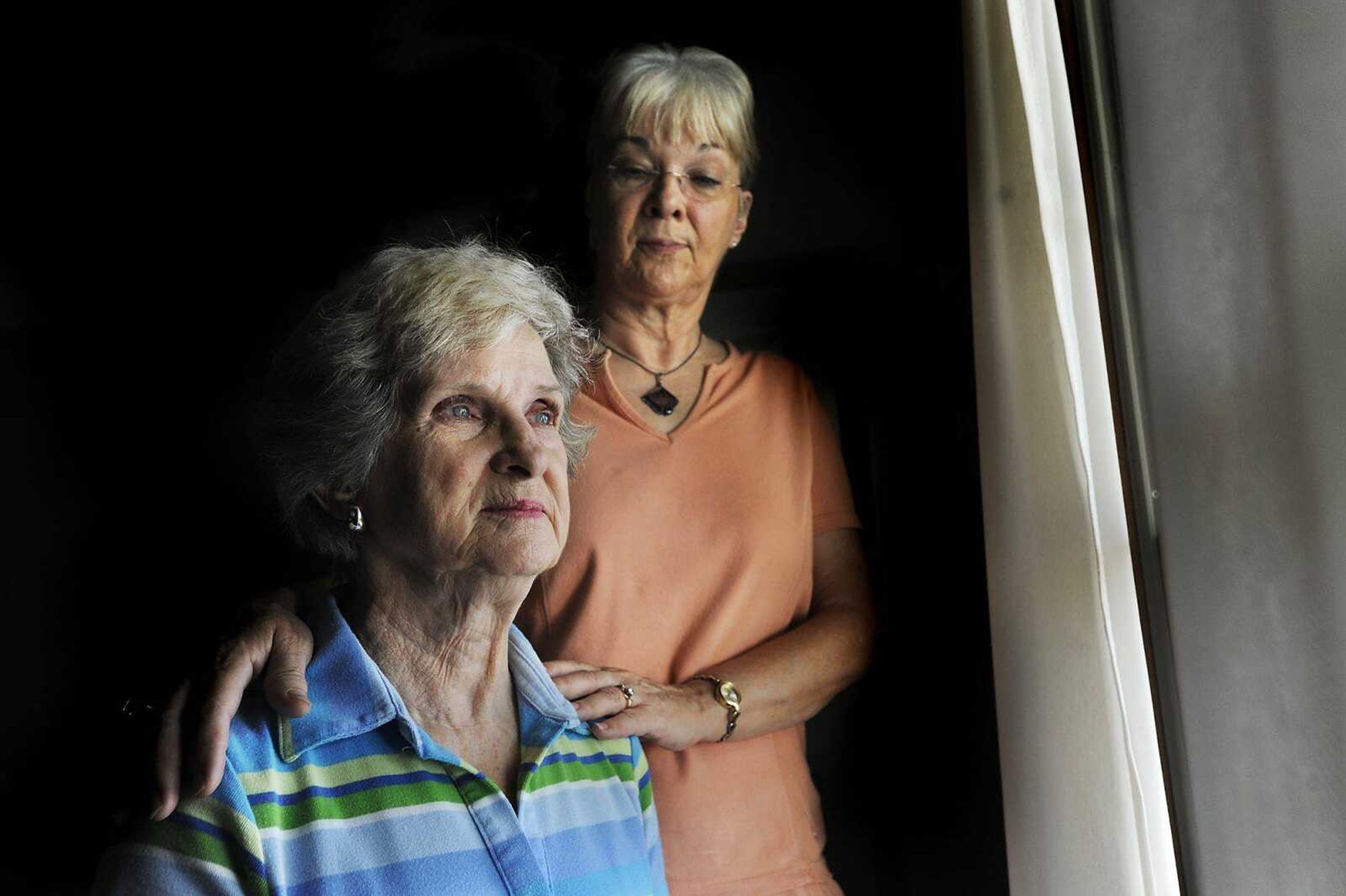Walking for a cure: Alzheimer's walk scheduled for next month at Cape County Park North
Lee Fee, 80, volunteers at the Missouri Veterans Home -- going to dances, playing bingo with the residents, giving each of them a smile or reassuring pat on the arm. She goes to church and plays bridge weekly. Five years ago, Fee was diagnosed with the disease. She was the face of Alzheimer's for the Walk to End Alzheimer's in 2011. The next walk is scheduled for next month...
Lee Fee, 80, volunteers at the Missouri Veterans Home -- going to dances, playing bingo with the residents, giving each of them a smile or reassuring pat on the arm. She goes to church and plays bridge weekly.
Five years ago, Fee was diagnosed with the disease. She was the face of Alzheimer's for the Walk to End Alzheimer's in 2011. The next walk is scheduled for next month.
Alzheimer's is a type of dementia that causes damage and shrinkage to the brain. It can begin slowly, as much as 20 years before symptoms and diagnosis. This progressive disease is characterized by memory loss, especially when it comes to remembering new information.
Rhonda Ray, Fee's daughter, was a home health care nurse. When her father became ill in 2005, Rhonda spent two to three weeks a month in Jefferson City helping her mother care for him while her husband, Stephen, and son, Warren, remained in Cape Girardeau.
In 2008 they each sold their respective homes, bought a larger one in Cape Girardeau, and consolidated households. Shortly thereafter, her father was put into a nursing home because they could no longer safely care for him.
He passed away in 2010. An autopsy revealed that he had Alzheimer's, dementia with Lewy bodies and Parkinson's disease dementia.
Age is the biggest risk factor for Alzheimer's. Most patients are age 65 or older, although there are cases of earlier onset. Family history and deterministic genes -- genes that directly cause a disease -- are other causes that have been found.
Alzheimer's does more than steal memories. It changes families. Often the patient cannot remember or recognize their loved ones. With the progression of the disease, they do not know them at all. The loved ones become the caretakers and are frequently off balance because the needs of the patient are ever changing.
According to Ray, her mother's mood can change instantaneously. She'll say she doesn't want to go somewhere and shows up dressed and ready to go five minutes later.
"She's pretty good at keeping a good mood," Ray said. "She just gets frustrated at not being able to remember and having to repeat constantly."
There is no cure for Alzheimer's, though some drugs may provide some symptom relief. According to the Alzheimer's Association, there is a heart-brain connection with the disease, including cardiovascular factors, physical fitness and diet. A Mediterranean diet is cited as one heart-healthy option good for brain health. This includes whole grains, fruits and vegetables, fish and shellfish, nuts, olive oil and other healthy fats, and little red meat.
"It's so much harder than I thought it would be," Ray said. "Mom and Dad were square dancers. They were athletic. Music still gets a smile on her face and a light in her eyes. It's hard watching -- what she can't do. Seeing her try so hard to remember something or to do something, then when she can't, it makes her sick to her stomach. It's scary for all of us."
The Alzheimer's Association has annual Walks to End Alzheimer's in more than 600 communities nationwide. The purpose of the walk is to bring communities together to raise the awareness level of Alzheimer's, and to raise money to fight the disease. There is no cost to participate.
"We generally have 500 to 600 people there," said Stephanie Rohlfs-Young, the outreach director for the Alzheimer's Association of St. Louis.
A portion of the program recognizes people's relationship to Alzheimer's. Each participant is given a colored pinwheel flower. Each color represents that person's relationship to the disease. At one point, the flowers are all held up.
"Symbolically, it's about lifting up the caregivers," Rohlfs-Young said.
When a participant registers they are given the information and tools needed to help with fundraising before the event. Locally, the annual Walk to End Alzheimer's will be held Sept. 15 at Cape County Park North. Registration is at 8 a.m. and the walk begins at 9 a.m.
"We'll let people register right up to the time to walk," said Rohlfs-Young. "But the earlier people register, the more time they have to get sponsors."
Volunteers are also needed to help with the setup of the event.
Ray said it is interesting riding in a car with her mother on a clear day. Fee picks out shapes in the clouds, notices flowers and other little things.
"She sees the things I am too busy to notice," Ray said. "She points them out. There is a beauty in Alzheimer's because it puts a smile on my face."
Connect with the Southeast Missourian Newsroom:
For corrections to this story or other insights for the editor, click here. To submit a letter to the editor, click here. To learn about the Southeast Missourian’s AI Policy, click here.










